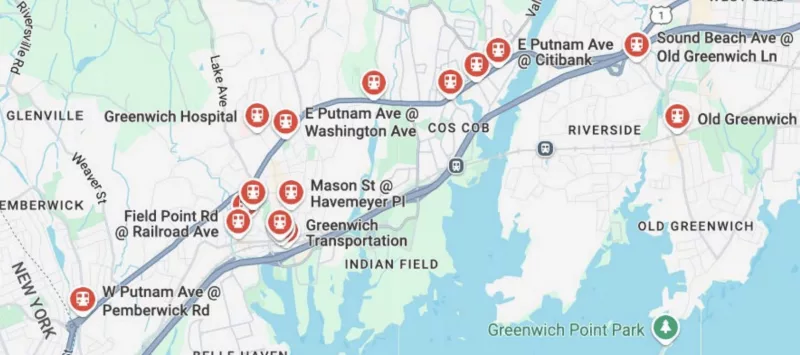By Anne White
Connecticut lawmakers are revisiting a controversial housing bill aimed at encouraging transit-oriented development, a move that could significantly alter local zoning policies in towns like Greenwich and New Canaan. The proposal, previously known as “Work, Live, Ride” under HB 5390 in 2024, has been reintroduced in the current legislative session as HB 6831, with provisions that prioritize state funding for municipalities that opt into high-density housing near transit hubs.
The bill comes as Connecticut faces ongoing housing affordability challenges. According to the Connecticut Association of Realtors, the state’s median home price increased by 8.7% in 2023, outpacing wage growth and limiting affordability for middle-income households. Rental prices have also climbed, with the state’s rental vacancy rate dropping to 3.2% in 2024, the lowest in over a decade. Advocates argue that transit-oriented development (TOD) can help alleviate housing shortages by creating higher-density communities near public transportation, making it easier for workers to live closer to jobs.
State Rep. Tina Courpas, who replaced Rachel Khanna and now serves on the Housing Committee, has been working alongside Sen. Ryan Fazio to track and address all legislative proposals affecting local zoning control. Their goal is to catch bills in committee that could override local decision-making on wetlands, environment a l regulations, flooding, and clear-cutting concerns. Courpas strongly opposes HB 6831, citing its coercive funding structure.
“There’s nothing stopping municipalities from developing near transit hubs now. This law is about the heavy hand of the state government coercing Towns with a stick to develop in transit areas. There is no good choice for a Town to make. If a Town opts into the TOD framework, it loses local control. If a Town doesn’t opt in, it is penalized financially,” Courpas said.
She also raised concerns about the bill’s vague environmental provisions. “As a coastal community, Greenwich must have a say in how development affects our waterfront and surrounding infrastructure. The language in this bill does not make it clear whether local voices will be heard on these critical environmental concerns.”
The public hearing for the bill was lengthy, stretching from 10:30 AM to midnight. According to Courpas, opposition was widespread, with testimony against the bill coming from first selectpersons, local residents, municipal advocacy organizations like Connecticut 169 Strong, and representatives from the Connecticut Office of Small Towns.
“There was a lot of testimony against the Bill,” Courpas said. “Even law makers from rural communities voiced concerns, saying they don’t have the infrastructure to support what this Bill mandates. I will oppose it in the House at every possible opportunity because the District is resoundingly against it, and I don’t believe it is good for Greenwich and Stamford.”
First Selectman Fred Camillo submitted testimony to the legislature’s Planning and Development Committee, calling the bill “both misleading and overreaching.” Camillo criticized the so-called “opt-in” provision, stating that it is not truly voluntary.
“The ‘opt-i n’ option makes this sound purely voluntary when in fact, it is threatening and punitive. Opt-in, or, as the bill states, your municipality will get ‘deprioritized’ (lose state funding),” Camillo wrote.
He argued that the legislation undermines local self-governance, a principle that has long defined Connecticut communities. “No one in a distant Capitol, figuratively and literally, knows what is better for a local government than those who live there and those who serve there,” he stated.
Camillo warned that HB 6831 would force towns to cede zoning control to a state-appointed coordinator who could overrule local boards. “I have yet to meet a local official anywhere in the state who thinks that is a good idea.”
He also pointed to the lack of environmental and historic preservation safeguards in the bill. “In a town like Greenwich, where we take pride in our historic venues and environmental protection measures as well as our local public housing efforts, this is a serious concern that threatens centuries of proud tradition of protection and progress,” he wrote.
Camillo further raised concerns about the bill’s elimination of public hearings for most developments, calling it an “undemocratic proposal being debated in the Constitution State.”
Sen. Ryan Fazio, who successfully fought to block HB 5390 last year, echoed many of Courpas’ and Camillo’s concerns. “I’ll offer better solutions at the beginning of the process. I’ll debate it tirelessly on the front end, and on the back end, I’ll be ready to filibuster it for many hours in the Senate if need be,” he said in an interview with the Sentinel.
“The problem with a two-to-one legislature is that if they make something a top priority, it really can’t be stopped. If they make it a mid- or lower-level priority, it becomes something that you can contend with and potentially stop in the minority,” Fazio said.
He also questioned the bill’s funding structure. “The concern is that towns that don’t opt in may find it harder to access funding that was previously available. Limited resources mean prioritization inherently impacts others.”
Fazio indicated plans to introduce amendments to narrow the bill’s scope. “I’m definitely going to propose amendments to this to narrow the funding to just issues related to sewer and water expansion. So it’s very specific and would retain the ability of our town to be eligible for hundreds of millions of funding. And I’ll lower the prescribed zoning as well.”
Gov. Ned Lamont has expressed support for TOD policies, citing potential economic benefits. Studies from the National Association of Realtors have shown that TOD developments can increase foot traffic to local businesses, though the impact varies depending on existing infrastructure. When asked about the governor’s position, Fazio noted, “I think he has indicated, the news reports have indicated, that he would sign it.” Whether HB 6831 advances will depend on legislative priorities and the political capital invested by its proponents.
As the legislative process unfolds, local officials and residents are encouraged to engage and provide feedback before further action is taken.
Residents can contact their local representatives and senator to share their opinions:
State Sen. Ryan Fazio (R-36) – Serves Greenwich, Stamford, and New Canaan.
Email: Ryan.Fazio@cga.ct.gov | Phone: (860) 240-8800
State Rep. Tina Courpas (R-149) – Serves Greenwich and Stamford.
Email: Tina.Courpas@housegop.ct.gov | Phone: (860) 240-8700
State Rep. Stephen Meskers (D-150) – Serves Greenwich.
Email: Stephen.Meskers@cga.ct.gov | Phone: (860) 240-8585
State Rep. Hector Arzeno (D-151) – Serves Greenwich.
Email: Hector.Arzeno@cga.ct.gov | Phone: (860) 240-8585



